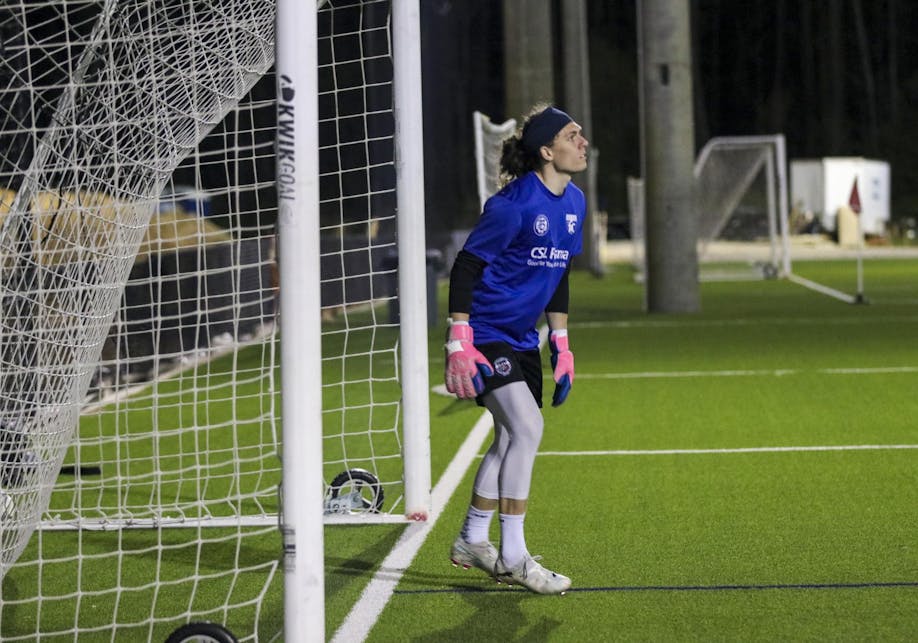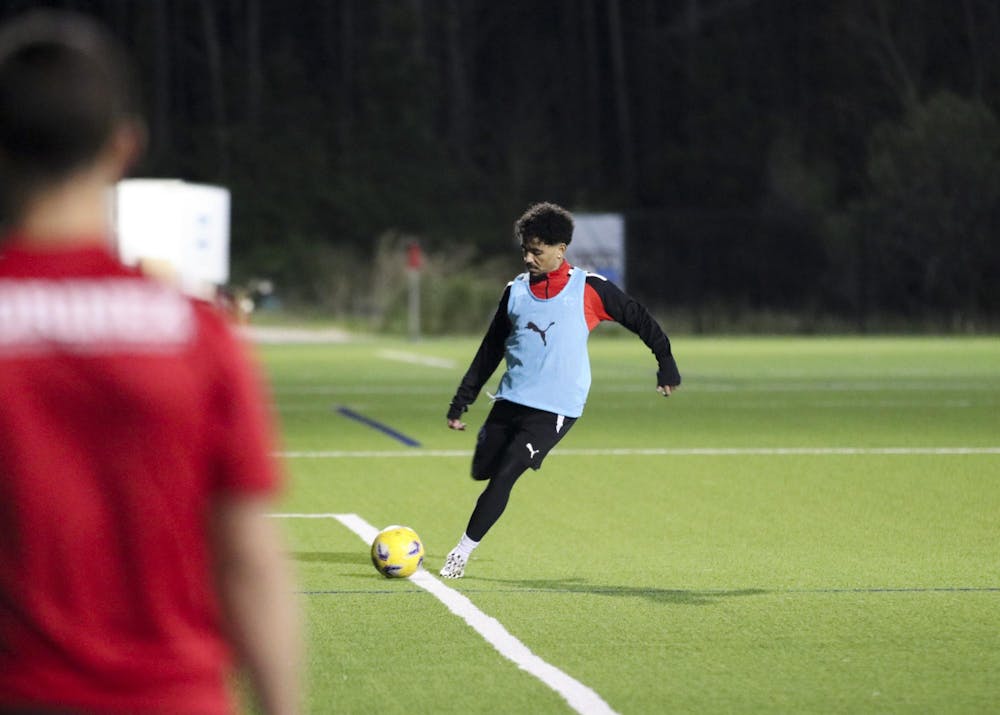Columbia native Asher Quave-Robinson is familiar with the sacrifices soccer players make in pursuit of the opportunity to play professionally.
Quave-Robinson competed for multiple youth clubs in the Columbia area before playing four seasons of college soccer at Pfeiffer University, an NCAA Division III school in Misenheimer, North Carolina.
He felt that he “wasn't a player that was going to be good enough” to be selected in the collegiate player draft for Major League Soccer early in his career but was determined to play at the next level, going to great lengths to do so.
“Money that I had saved up in college — went and tried out for as many teams as I could. Slept in parking lots, and you know, just trying to make it somewhere,” Quave-Robinson said. “Eating peanut butter and jelly, just saving money to go out to as many tryouts as I could."
Quave-Robinson eventually found opportunities to play professional soccer in the United States, Germany and Canada before transitioning to coaching in August 2015.
He has since coached at two South Carolinian colleges, Columbia International University and Converse University, before taking on his current role as the head coach and scout for South Carolina United Heat, a Columbia-based semi-professional soccer club that was founded in 2021.
The team is a “pro-farm” club that participates in as many competitions as possible, Quave-Robinson said. One of those competitions is the Lamar Hunt U.S. Open Cup, which pits professional and amateur soccer clubs against each other in a knockout-style format and is known as the oldest ongoing soccer tournament in American history.

Goalie Zachary Rowell prepares to block a shot during South Carolina United Heat's practice on March 29, 2024, at the Southeastern Freight Lines Soccer Center. This season will be Rowell's second year with the team.
And in the 2024 U.S. Open Cup, the team has emerged as one of the "underdog" stories of the tournament, as it defeated one professional team and nearly beat another.
In his time with the team, Quave-Robinson has made it his goal to help the club’s players achieve their professional aspirations.
He said he is using the team’s recent success in the U.S. Open Cup to increase the club’s exposure at the national level and allow players to also use it as a stepping stone to reach their professional aspirations.
“The Open Cup is just another way that we get to showcase the quality that we have and try to help those guys find a pathway for themselves in the game,” Quave-Robinson said.
The club has attempted to reach the first round of the U.S. Open Cup twice in its young history. It nearly qualified for the 2022 edition of the tournament but was forced to forfeit its final-round qualifying match due to a COVID-19 outbreak in the team. It reached the final qualifying round again the following year but suffered a 2-1 extra-time loss to Club de Lyon FC and was eliminated from the competition.
Fortunes would flip in the team's favor, however, when it qualified for the 2024 U.S. Open Cup. The club won all four of its qualifying matches, including a 4-2 win over Tennessee Tempo FC on Nov. 18, 2023, to reach the opening round of the tournament for the first time in club history.
“It was a nice experience because we got to go there and … (have) everyone together, so, as a whole experience from beginning to end, it was amazing,” defender and team captain Ivan Vlek said. “Taking the team to the competition for the first time was definitely special.”
Midfielder Kike Molina said the team’s ability to come together, despite vast differences in age and country of origin, stems from understanding each other’s cultures and how it influences their motivation to play soccer.
"Argentinians are very passionate about football. People from England, they are too, but they are more passive, and they understand the game in a different way,” Molina said. “Understanding what it means to everybody and having that clear … is something that gets the team together.”
The team learned on March 1 that it would play its first-round U.S. Open Cup match on the road against Crown Legacy FC, a which competes in MLS NEXT Pro, a professional league operated by MLS that emphasizes youth player development. Crown Legacy FC is the reserve team of MLS club Charlotte FC and provides a direct pipeline from the club's academy to its first team.
SCU Heat previously picked up a 3-2 win over Crown Legacy FC in a preseason game earlier in the year. Vlek said the team did not alter its preparations for its rematch on March 21, despite the higher stakes associated with playing in the U.S. Open Cup.
“To be honest, it was just another game, nothing different. There was no reason for us to take that game differently than the ones we play every weekend because, in the end, we’re just trying to win every single game,” Vlek said. “We already played them, so we already knew exactly how they played, the things they do.”
Both teams exchanged close chances in the first half of the match, Quave-Robinson said. But Crown Legacy FC eventually found the breakthrough it needed when it was awarded with a penalty kick.
“You kind of have your heart in your mouth, and you think maybe you got one foot out of the Cup,” Quave-Robinson said. “In my head, I’m like, ‘Alright, what do we do next if this goes in? How do we get one more chance?’”
Quave-Robinson did not have to think about that scenario for long, as midfielder Filip Mirkovic missed the kick and kept the match scoreless. But it also did not take long for SC United Heat to find itself in a similar situation, earning a penalty kick of its own at the other end of the field.
Forward Wilterlynd Inalien, who took the penalty kick, said he was unfazed by the high pressure surrounding the moment and delivered a strike that found the back of the net.
“I was very, very, very confident about it,” Inalien said. “I think in moments like that, I always want to be the one to kind of step up and take the burden, whether it’s a penalty or if it's a winning goal, so I wasn't — I didn’t feel nervous or anything like that.”
For Molina, watching Inalien score and his teammates defend for another two minutes before the final whistle blew provided him with both relieving and rewarding feelings.
“More than anything, (there was) so much passion in terms of the passion for the badge because everybody has been working so much for this ... (and) sacrificed other things,” Molina said. “If we’re done with football, we will be able to make more money, or focus on other things, or create a business, or something like that, but the passion for the game and the passion for the badge is what allows us to keep going.”
Molina said he was also proud of the team’s strong work ethic, especially after seeing a post on X, formerly known as Twitter, that likened the team’s players to “drywall installers and substitute teachers.”
Vlek said nearly every player on the team balances pursuing their dreams of playing professional soccer with blue- and white-collar employment opportunities. This has helped create an encouraging and supportive atmosphere around the team, Molina said.
“Just coming back to the team and being around people that have a common goal and a greater goal bigger than yourself is the best thing possible,” Molina said. “When you’re not the only one sacrificing and you see everybody else sacrificing, it gives you a different energy.”
Vlek said the club's players share common individual and team-centric goals. As far as the entire team is concerned, that goal is to compete against as many professional clubs as possible, Vlek said.
But from an individual standpoint, each player wants to use the U.S. Open Cup as an opportunity to increase their exposure. Vlek said he believes that many of his teammates are deserving of an opportunity to play professionally.
“During the (United Premiere Soccer League season), it’s very hard for you to get seen and to be at the right place with the right person. It is very, very hard. So, this game (is) our biggest chance to be seen by someone,” Vlek said. “It could be the team you’re playing against, or it could be someone else, but I feel like that’s the most important thing.”
SCU Heat would not progress beyond the second round of the competition, though, as it fell 4-3 in a penalty shootout to Charlotte Independence after 120 minutes of scoreless play on Tuesday.
Despite the loss, Quave-Robinson said the team will carry the momentum it gathered in its run in the U.S. Open Cup into its league season and beyond.
“I said to the boys the other night, ‘That’s the standard for where we go from here,'" Quave-Robinson said. "'And if we keep ... a semblance of that performance, and we carry that on, and we build on it week by week, the sky’s the limit for what this team can do.’”

